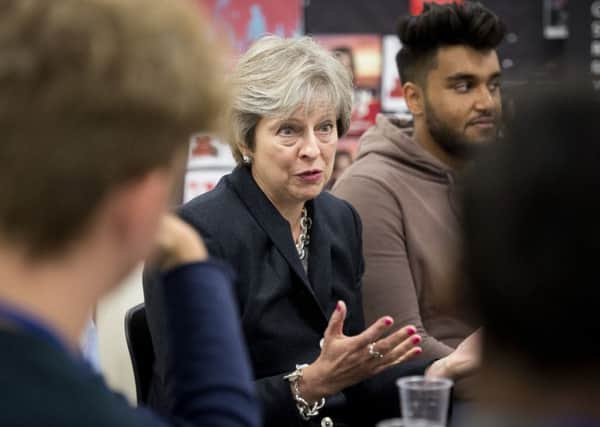May calls on society to '˜explain or change' UK's racial disparity


The Prime Minister will tell government, business, police and other institutions they have “nowhere to hide” and must help ensure race is never a barrier to people achieving their goals in life.
The audit will lay bare on a new Ethnicity Facts and Figures website at 12.30pm today how people of different races are treated in areas including health, education, employment and the criminal justice system.
Among the findings are:
Advertisement
Hide AdAdvertisement
Hide AdThe unemployment rate for black, Asian and minority ethnic people (eight per cent) is nearly double that of white British adults (4.6 per cent), with a larger gap in the North (13.6 per cent) than the South (nine per cent);
White people, Indians and Pakistanis are more likely to own their own home than Bangladeshis and black people, and there are disparities in home ownership even after taking account of age, geography, income and socio-economic group;
White teenagers are four times more likely to be smokers than black teenagers;
Chinese and Asian secondary school pupils perform better than white and black children, particularly those eligible for free school meals, although Pakistani pupils consistently fall behind, and gypsy, Roma and traveller children do significantly worse;
Advertisement
Hide AdAdvertisement
Hide AdAmong children aged between seven and 11 (Key Stage 2), 71 per cent of Chinese children met the expected standard for reading, writing and maths, compared with 54 per cent of white British pupils and 13 per cent of white gypsy and Roma pupils;
Less than a third (32 per cent) of white British pupils on free school meals reached the expected standard at Key Stage 2 – worse than any other ethnic group;
Ethnic minorities are under-represented at senior levels across the public sector;
A high percentage of people of all ethnicities feel they “belong to Britain”, with little variation between groups (white 85 per cent, Asian 84 per cent, black 81 per cent).
Advertisement
Hide AdAdvertisement
Hide AdTo launch the new website, thought to be the first official resource of its kind in the world, Mrs May will host a discussion around the Cabinet table involving “key stakeholders”.
She will tell them the audit will become an “essential resource in the battle to defeat ethnic injustice”.
“People who have lived with discrimination don’t need a government audit to make them aware of the scale of the challenge,” the PM will say.
“But this audit means that for society as a whole – for government, for our public services – there is nowhere to hide.
Advertisement
Hide AdAdvertisement
Hide Ad“These issues are now out in the open. And the message is very simple: if these disparities cannot be explained then they must be changed. Britain has come a long way in my lifetime in spreading equality and opportunity. But the data we are publishing today will provide the definitive evidence of how far we must still go in order to truly build a country that works for everyone.”
On a visit to Dunraven School in Lambeth, south London, on Monday, Mrs May said: “What I hope this audit will bring is a change in attitude so that everyone is treated equally, no matter what their background, and this is never a barrier to getting on in life.”
In response to the findings of the audit, in education, an external review will be brought forward to improve practice in excluding children from school, with a focus on ethnic groups disproportionately likely to be suspended or expelled.